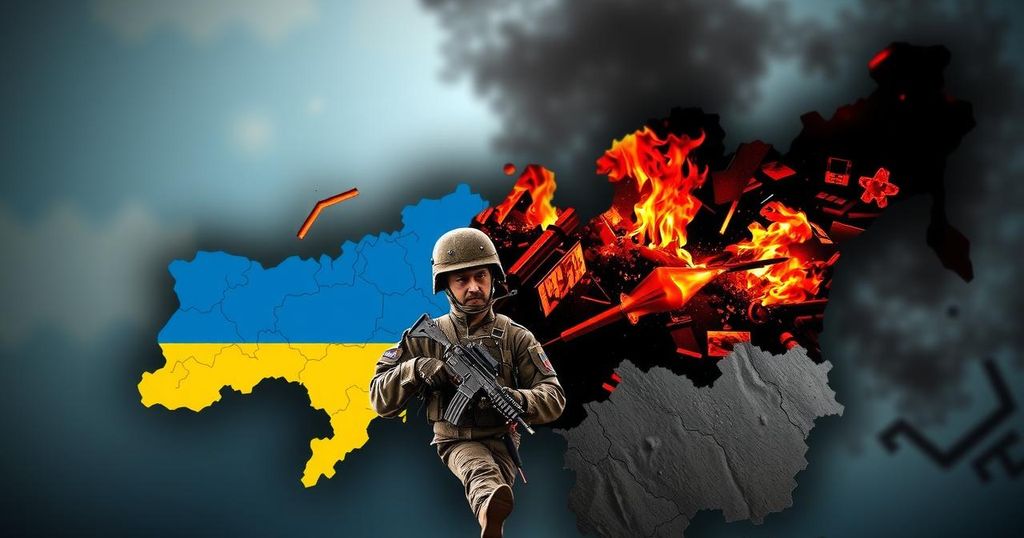Media Censorship in Central Asia: The Silence on Ukraine’s War
State media in Central Asia exhibit a troubling silence regarding Russia’s invasion of Ukraine, reminiscent of Soviet censorship. Turkmenistan’s media completely avoid the topic, while others, like Kazakhstan and Uzbekistan, also limit discussions due to political sensitivities, attracting criticism for their inadequate coverage. In contrast, independent outlets strive to report extensively on the conflict, often facing severe repercussions for their efforts.
In Central Asia, official state media largely refrain from reporting on Russia’s invasion of Ukraine, akin to the censorship exercised by Soviet-era publications. This is particularly evident in Turkmenistan, where the state media have not reported meaningfully on the conflict since the invasion commenced. Across the region, state-controlled media have minimalized coverage despite the evident impacts of the war on local populations, including the return of soldiers’ remains from Ukraine. While independent media outlets have provided robust coverage of the conflict, their approach has sometimes attracted the ire of Russia, prompting many state-run channels to completely halt references to Ukraine. Kazakhstan, sharing a lengthy border with Russia, has made some of the most forthright statements in the region, notably refusing to acknowledge territories annexed by Russia during the conflict. However, according to state TV, the ongoing situation in Ukraine appears irrelevant. Recent broadcasts have featured news from locations as distant as Bolivia and Puerto Rico, while serious developments in Ukraine have gone unreported since early 2023. In neighboring Uzbekistan, similar trends are observable, with state media neglecting the conflict almost entirely, and Tajikistan mirrors this silence as well. The Kyrgyz state broadcaster provides limited coverage, mostly reporting on significant events only when unavoidable, but adopts a neutral tone. In contrast, privately-owned media in these countries exhibit a range of coverage for the war, from brief geopolitical updates to in-depth reporting from the Ukrainian frontlines. Kyrgyzstan’s 24.kg news agency faced criticism and legal repercussions for their coverage, especially for using the Kremlin’s terminology regarding the conflict and later conducting an interview with a Ukrainian battalion commander. Following a government crackdown and external pressure, their operations were hindered significantly. However, Uzbekistan’s private media largely continues to report without substantial retaliation. Overall, while independent news outlets strive to report accurately on the war in Ukraine, the potential for repercussions from Russian authorities looms large, leading to a highly cautious approach among state media in the Central Asian region.
The phenomenon of media censorship in Central Asia reflects historical precedents set during the Soviet era, where misinformation and control over the narrative were commonplace. Today, Turkmenistan exemplifies the extreme extent of this control, as its state-run outlets entirely disregard the ongoing war in Ukraine. Other Central Asian states, while exhibiting some variations in their approaches, have also opted for minimal coverage of the conflict, prioritizing diplomatic relations with Russia over comprehensive reporting. With the war impacting the local populace through the loss of soldiers and economic repercussions, the reticence of state media to engage with the issue raises questions about the independence and integrity of journalism in the region.
In conclusion, Central Asian state media largely adhere to a policy of silence regarding the war in Ukraine, mirroring Soviet-era practices of censorship and narrative control. Meanwhile, independent media, while committed to providing comprehensive coverage, face significant challenges and repercussions from both state authorities and external pressures, particularly from Russia. This precarious balance highlights the complexities of media freedom and political alignment in the context of a highly sensitive geopolitical conflict.
Original Source: www.rferl.org




Post Comment